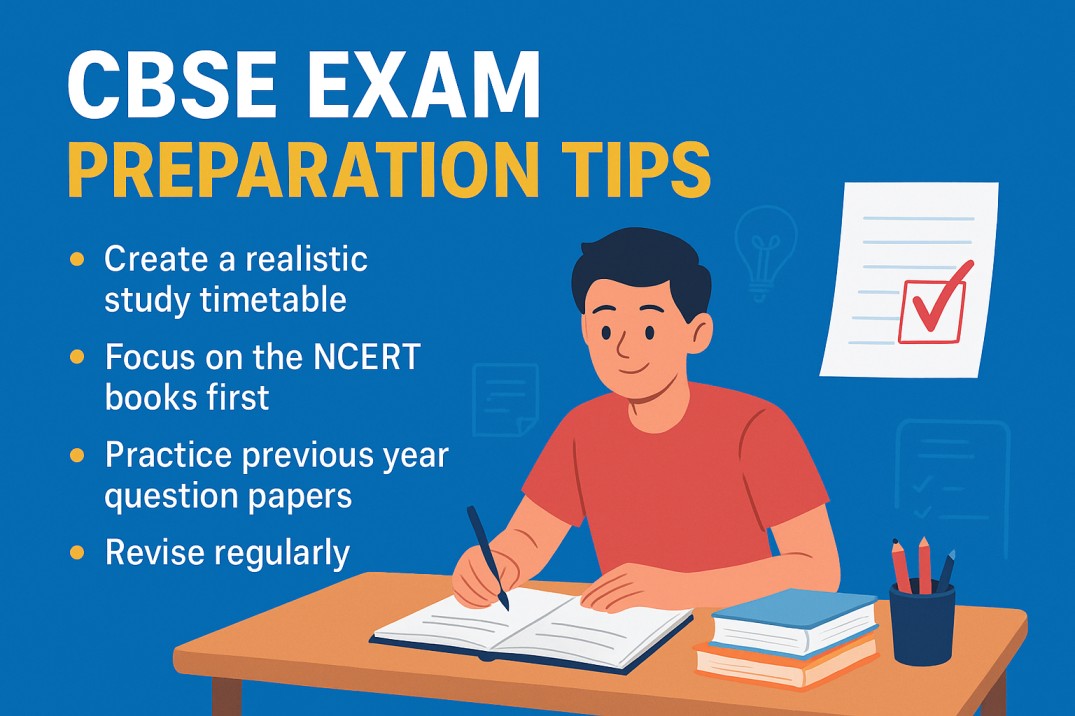As much as preparing for CBSE board exams may seem stressful, using an appropriate strategy will allow you to use this hurdle as an opportunity to do well and gain confidence for the rest of your academic pursuits. These exams will strain you if you try to cram everything at the last minute, instead, it is important to plan, study smart, and revise with laser focus. Below we have formulated the most effective methods to optimize your study time for for CBSE Board Exams.
1. Make a Practical Study Timetable
Time allocation is a central component to effective preparation. Focus on time allocation for each subject and try to spend more time on the weaker subjects. Do not plan for marathon study sessions, study for an hour or more and take a break. Try and stick to your schedule as much as possible, this will help you develop self discipline.
2. Concentrate on the NCERT Books First
Most content in the CBSE board exams comes from the NCERT syllabus. Textbook NCERT’s are always the first to be attended to, as the rest will be built from it, meaning it is vital to master it. Take time to read, highlight and do the practice questions in the NCERTs and do not turn to your reference/browne guides or the sample papers.
3. Practice Previous Year Question Papers
Using past years’ question papers will enhance your exam preparations. This will allow you to gauge and detect the structure of the exam. Also, understanding the most common questions and the allocation of marks for each question will be easier. Practicing past papers helps to increase your speed and accuracy during the exam, and makes you more comfortable and relaxed on exam day.
4. Use Sample Papers and Mock Tests.
Solve the past papers and complete the CBSE sample papers and mock tests, as you are allowed to do more than one in succession. Mock tests and sample papers serve as checks for your preparedness, but more importantly, they assist you in pinpointing your vulnerable spots. Correct the errors in your revisions for the next attempt after performing a comprehensive self-analysis.
5. Revise Regularly
To remember information, revision should be done. This should be done on a subject by subject basis rather than attempting all subjects simultaneously. An important method of revision is to summarize key points such as formulas, definitions, and concepts into a separate notebook for ease of access. Regular revision is one of the key techniques of not forgetting information one has already learnt.
6. Strengthen Writing Practice
In descriptive CBSE exams, students will benefit from practicing writing succinctly and clearly. Answering in the correct format is essential to the question, and so are headings, sub-points, and drawings that enhance the responses. Writing practice helps in gaining speed and improving presentation, all of which are important in achieving a high score.
7. Working On Diagrams, Maps, and Flowcharts and Other Subjects
There are many subjects that require diagrams, charts, or even maps, such as Science, Geography, and Biology. Visual aids, along with diagrams and charts, fetch you better marks, and also, make your answers more appealing to your examiners. Therefore, Practice how to draw, and how to label them effectively.
8. Stay Healthy and Maintain Positivity
Eating healthy and proper meals helps you stay focused and energized, as well as helps maintain proper hydration and sleep. You can avoid screens or manage stress by using other means, such as meditation, exercise or engaging in hobbies. Staying positive and having optimism is as important as hard work. Balanced students of the
best school in gurgaon demonstrate the importance of structure balance on academics and other non academic activities, and even excess can be useful properly preparing for the exam.
FAQs
Q1. How many hours a day should a student study for the CBSE board exams?
A student is expected to study in focused, and planned sessions for 6-7 hours within a day. Their break times are also scheduled within the study, as well. Instead of how many hours studied, the quality of study matters more.
Q2. Is NCERT sufficient for the CBSE board examinations?
NCERT textbooks are important and primary sources for the CBSE examinations, and also accompanied with practice of sample papers and reference books for better understanding.
Q3. What is the best way to avoid stress when taking an exam?
You can try breathing exercises, board meditation, and positive visualization. Following and practicing a timetable is essential. Keeping yourself positive and living a balanced life helps a lot in stress management.
Q4. The revision for the board exams should be done, when?
As a thumb rule, revision must be initiated 2–3 months in advance of the examination. Starting on revision at an early stage helps in strengthening the concepts and better retention.
